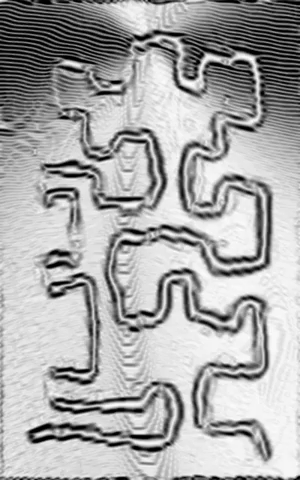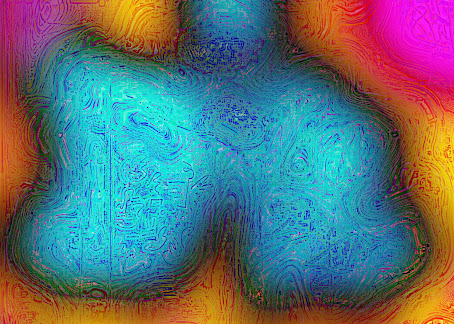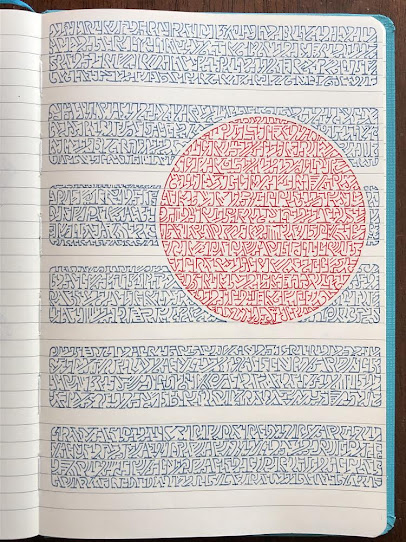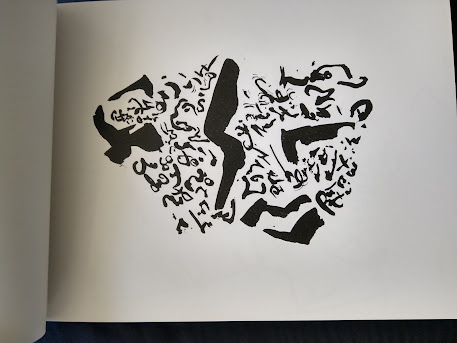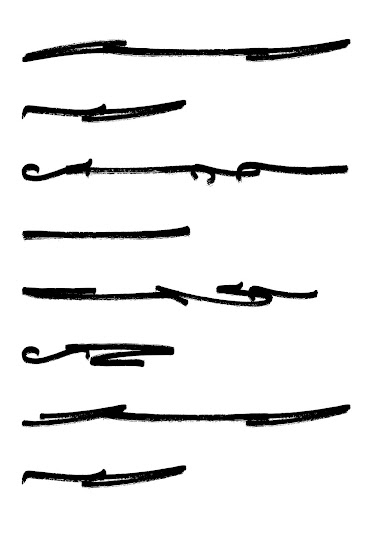This weblog explores asemic writing in relation to post-literate culture
Wednesday, December 30, 2020
Post-Asemic Press: Post-Asemic Press Author Cecil Touchon was intervi...
Monday, December 28, 2020
Tuesday, December 22, 2020
Saturday, December 19, 2020
Post-Asemic Press: Works & Interviews by Michael Jacobson was reviewe...
Sunday, December 6, 2020
Wednesday, December 2, 2020
Tuesday, December 1, 2020
Shapes by Tim Gaze is available now at Bandcamp! A Post-Asemic Press Sound Poetry/Sonic Release #005
It is titled ʂ ɦ ɑ p ɛ ʃ and is a full album of sonic speech invention.
Tim recently finished a degree in linguistics and his education serves him well in these recordings.
They are difficult to describe but are a pleasure to listen to. The recordings are a new direction pointing towards the future of sound poetry, where Tim engages with the technology of modern recording and effects, but also tells an ancient story of mind and magick. Without any more words, the album best explains itself. Also look out for Tim Gaze's collection of asemic writing Glyphs of Uncertain Meaning coming out this spring 2021 from PAP.
ʂ ɦ ɑ p ɛ ʃ sound poetry by Tim Gaze
The tracks were recorded between 2017 & 2020 at home all compositions written, produced & performed by Tim Gaze
All tracks are Creative Commons Attribution-NonCommercial license
Cover art & design by Tim Gaze
Sound poem 1 & sound poem 3 previously published in Utsanga 19
Influences: Henri Chopin, Jaap Blonk, dub, techno timgazesoundpoetry<@>gmail<.>com
Wednesday, November 25, 2020
An Interview with Michael Jacobson by Jay Paul on the Schizoaffective Blog about his new book Hei Kuu!
I was interviewed by Jay Paul on his blog Schizoaffective about my new poetry collection of senryu poems Hei Kuu. Click here to read the interview.
The poems are not asemic but they are the backstory behind my asemic writing.
Click here for more info on Hei Kuu, my poetry book of 409 senryu poetic-tales.
Tuesday, November 24, 2020
Sunday, November 22, 2020
Wednesday, November 18, 2020
SJ Fowler – The Selected Scribbling and Scrawling | Out now from ZIMZALLA
| Click here to buy for £11.99 in the UK. Click here to buy for £14.99 anywhere else in the world. Both prices include postage. |
The Selected Scribbling and Scrawling of SJ Fowler is an assembly of hand-drawn, instinctive visual poems from beyond the ragged edge of language. Supplemented by essays and oblique reflections, this expanded second edition is a not quite compendious compendium of Fowler’s asemic work.
Arguably the most comprehensive book of asemic poetry ever published in the UK, this sizeable revamped new edition includes images of live asemic performances alongside over 100 visual poems divided, and introduced, in chapters. Asemic neurons butt up against poetic constellations, portraits and diagrams. The volume is bookended with new articles on the asemic endeavours of SJ Fowler from David MacLagan, Tim Gaze, Michael Jacobson and David Spittle, plus a longform discussion between Fowler and Zimzalla editor Tom Jenks. Click here for a sample.
In this
new/old inexhaustible asemic writing genre, SJ Fowler digs, not a grave for
literature, but a hole to plant seeds for a new scribal species currently
undergoing a wild flowering on and offline. Fowler keeps his asemic gestures
rolling onto the cloud white pages by his pen striking like neuronic lightning,
waking up the reader to an essential epiphany: we are here to be human and to acknowledge
ourselves. From cave scribbling to blinding Internet speeds, It’s up to each
generation to reinvent the human asemic scrawl and scribble, and SJF is a
natural at this form of artistic expression, his “primitive” pen being a
perfect tool for him to use for this type of calligraphic work. In The Selected
Scribbling and Scrawling, and asemic writing in general, the purpose is
about taking in writing in its complete totality, and capturing the grand
swathe of historical and the contemporary writing styles, unifying and
synthesizing the non-verbal with the slightly legible word(s). SJF champions his
mighty pen like a precision instrument to harvest the agriculture of manuscription
swirling around inside his mind. As asemic readers and writers we witness this experience
together, and Fowler strives to entertain us well in the amount of time we spend
between the covers. Asemic writing is an interesting glue to hold an essential part of early 21st
century writing culture together, and SJF knows how to creatively express
himself honestly in this zeitgeist.
—Michael Jacobson, author of Works & Interviews and Hei Kuu
SJ Fowler is a writer, poet and artist who lives in London. His work has been commissioned by Tate Modern, BBC Radio 3, Somerset House, Tate Britain, London Sinfonietta, Southbank Centre, National Centre for Writing, National Poetry Library, Science Museum and Liverpool Biennial amongst others. As of 2020 has published eight collections of poetry, five of art-poetry, six of collaborative poetry plus volumes of selected essays and selected collaborations. His writing has explored subjects as diverse as prescription drugs, films, fight sports, museums, prisons and animals. He was part of the first ever Hub residency at Wellcome Collection, and is currently poet-in-residence at J&L Gibbons architects and formerly at Kensal Green Cemetery. He is associate artist at Rich Mix. He has been sent to Peru, Bangladesh, Iraq, Argentina, Georgia and other destinations by The British Council and has performed at over 50 international festivals including Hay on Wye, Cervantino in Mexico, Berlin Literature Festival and Hay Xalapa. His feature-length films have premiered at Whitechapel Gallery and his plays have been produced by Penned in the Margins and Dash Arts. He was nominated for the White Review prize for Fiction in 2014 and his short stories appear in anthologies such as ‘Liberating the Canon’. His visual art has been exhibited at the Palais de Tokyo, V&A, Hardy Tree Gallery, Jerwood Space and Mile End Art Pavilion, with installations at Kielder Forest and Tate St Ives. His librettos have been performed at LSO St Lukes, Wigmore Hall and Guildhall Music School. His articles have appeared in Nature, Vice Magazine and Jacket2. He’s been translated into 27 languages and produced collaborations with over 150 artists. He has pioneered the fields of performance literature, literary curation, collaborative poetry and Neuropoetics. His asemic writing, sound poetry and concrete poetry have also become known internationally.
He is the founder and curator of The Enemies Project and Poem Brut as well as poetry editor at 3am magazine and former executive editor at The Versopolis Review. He is lecturer in Creative Writing and English Literature at Kingston University, has taught at Tate Modern, Poetry School and Photographer’s Gallery and is a Salzburg Global Fellow. He is the director of Writers’ Centre Kingston and European Poetry Festival.
http://www.stevenjfowler.com/asemic
Monday, November 9, 2020
Sunday, November 8, 2020
Friday, November 6, 2020
Pareidolia by Vilde Valerie Bjerke Torset | A new asemic writing book from Timglaset
Vilde Valerie Bjerke Torset, Pareidolia - Dotremont's Daughter
This book is about unrelated things perceived as connected and significant. Pareidolia is this tendency in the context of reactions to visual stimuli. A cloud looks like a ship, a cluster of stars looks like a bear, a rock looks like a face. This book is about words. Just not their meaning. Which is to say, it’s about words, language, signs, lines and scribbles, as visual entities and graphic constructions, as material and impulse. Asemic writing would be the technical term; writing without semantic content.
"By a default paradox, it is close to impossible to accidentally create something on purpose. To write language, I think language. Mostly all the marks, the slashes and scrawls, come from a place of meaning, a stream of consciousness, or words that came into my mind, which I then tried to dismember on the page. Mostly all, but not always. Some are just marks."
"Asemia is for writing what pareidolia is for imagery. This book is faces and words, but also neither. It looks like, but it isn’t. Or it is."
Pareidolia - Dotremont's Daughter, 37 pages, high quality digital print on high grade matte paper, 150 gsm, with a cover of recycled brown card stock, assembled with interscrews from Manchester Automatic Machining Company Ltd. A4 landscape format (297 x 210 mm).
€13.00
Saturday, October 31, 2020
Friday, October 30, 2020
Marzi Margo's suggestion to make something asemic out of Gertrude Stein's writing by Volodymyr Bilyk
I have a new series for you - inspired by Marzi Margo's suggestion to make something asemic out of Gertrude Stein's writing. So i decided to handwrite some Tender Buttons while attaching a marker on selfie stick (don't ask). The result was a stain on the wall. So i took on the table and tried that way. And it mostly didn't worked too - but i had a lot of scribble that resembled alphabet - so i scanned it and recombined the scans into sequences. It was timeconsuming, pointless and fun. Never try this at home.




